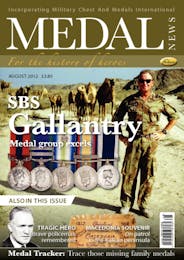Reunited we stand
MEDAL collecting is like any other hobby in as much that there are extremes—there are the Victoria Crosses that sell (as two did recently at Spink—see next month’s Market scene) for over £200,000 and then at the other end of the spectrum there are medals that fetch a thousand times less than that and yet each is just as important. Take the example from the York Con Fair recently (yes there are medals there too—come along in January) where a coin dealer asked us to put a Medal Tracker entry in the next magazine to search for his wife’s grandfather’s medals. It transpired that his wife had been researching her family tree and discovered that her grandfather’s British War Medal had been sold at auction a few years back. Knowing of a dealer in the room that specialised in the regiment in question I mentioned the search to him and he was sure that he knew who had purchased the medal.
As I write I am confident that the family will be reunited with their ancestor’s award within a few weeks. The medal in question isn’t worth a great deal monetarily but to the family it will be priceless. Such stories abound in our hobby, stories of reunites to families, or collectors, who will treasure their new acquisition just as much as if they had spent hundreds of thousands of pounds on it. Headline medals such as a VC, a special forces DCM, a Falkland’s bravery award or a high ranking officer’s Gold Cross group are always worth reporting, of course they are, I call it the Top Gear effect where we all like to see super cars tested even though we’ll never hope to own one ourselves, yet it is stories about the humble medals, the Victory medal finally reunited with its silver counterpart, the LS&GC brought back together with an IGS or a QSA remarried to its KSA that really makes this hobby so very different from most others. With coins or stamps, or indeed any other “collecting” hobby it is the acquisition that is the important thing—collectors strive to get a complete date run, a full set of those coins/stamps/notes ever issued, a selection of rarities etc, etc. but never do those items have any real connection to each other. Yes a numismatist eager to complete a run of 20th century shillings will rejoice when he finally buys a 1905 example but that coin will have nothing in common with the shillings from 1904 or 1906 apart from the fact that it looks similar and was minted in the same place. A medal collector who finally manages to secure that elusive reunite knows that he has managed to bring together a group of medals that really do belong together, that were awarded to the same man, that once before sat side by side and that should never have really been parted in the first place. The thrill of a reunite, whether to a group or a family has to surpass the achievement of even the most pernickety of other collectors—it doesn’t matter whether the coin or note you are seeking is one of the rarest on the planet—you know that eventually an example will surface and when it does only the size of your wallet will determine your success. With medals it’s different. It isn’t about money, it isn’t about whether you can dig deep and look big. What it’s about is whether or not you can bring those medals back together and it doesn’t matter whether the medal in question costs £10 or £10,000— I defy any one of us not to feel absolutely elated when we are able to “bring a medal home”. I don’t, as a rule, buy broken groups, or at least I haven’t until recently but having spoken to a number of our “medal tracker” successes this month, both collectors and families who have no real interest in our hobby apart from to own the medals of family members, I’m wondering whether I shouldn’t maybe change tactics a little. It is all very well buying complete groups to my “theme” from dealers or at auction but by doing that I miss out on that unique feeling that only we medal collectors get— that wonderful sense of achievement you get from a reunite. I’ve managed it a few times — both through “Medal Tracker” and through sheer luck and there is nothing in collecting that’s comparable to that feeling. We would do well to remember that occasionally—and remember too that just because a group is incomplete at the moment that doesn’t mean it has to stay that way and if we are the ones to make sure it gets completed again we’ll be telling the story for years to come. Ask yourself this for a second— is the group in your collection that really sticks in your mind the one you paid the most money for or is it maybe the originally broken one you managed to bring back together? Or perhaps the family medals you managed to bring back home? Worth thinking about isn’t it?

Archives
-
2024 (10 articles)
-
2023 (22 articles)
-
2022 (26 articles)
-
2021 (29 articles)
-
2020 (44 articles)
-
2019 (23 articles)
-
2018 (21 articles)
-
2017 (27 articles)
-
2016 (32 articles)
-
2015 (25 articles)
-
2014 (30 articles)
-
2013 (46 articles)
-
2012 (32 articles)
-
2011 (44 articles)
-
2010 (75 articles)
-
2009 (49 articles)
-
2008 (42 articles)
-
2007 (51 articles)
-
2006 (48 articles)
-
2005 (7 articles)
-
2004 (7 articles)
-
2003 (12 articles)
-
2002 (11 articles)
-
2001 (5 articles)









